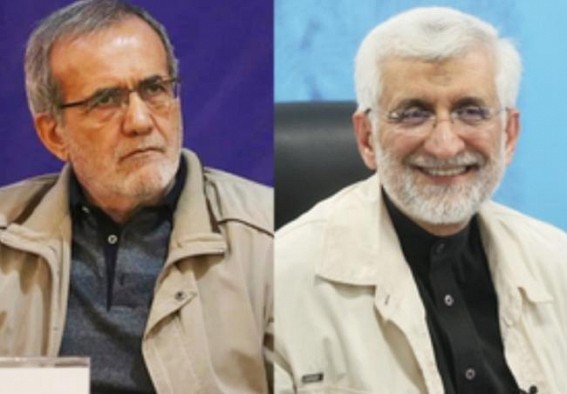TIWN July 1, 2024

New Delhi, July 1 : Snap polls to elect the new Iranian President saw a new low in turnout and went into a runoff, as widely predicted. However, the position of the two candidates for the run-off - the first since 2005 - is revealing about public sentiments, the limitations of political labelling, and more significantly, the divergent mood in the establishment.
Masoud Pezeshkian, the sole reformist candidate allowed in the race after being debarred in 2021, secured first place with 10.41 million votes, ahead of his ultra-conservative rival and former nuclear negotiator Saeed Jalili, with 9.47 million, out of the 24.5 million votes cast, or just about 40 per cent of the 61 million-odd electorate.
Surprisingly, Majles Speaker and former Tehran Mayor Mohammad Baqer Qalibaf, whom some polls had tipped as a prime contender over both Pezeshkian and Jalili, was the distant third with 3.38 million votes, while, the only cleric in the contest, Mostafa Pourmohammadi, had to be content with 206,397 votes
Tehran Mayor Alireza Zakani and Vice President Amir-Hossein Ghazizadeh Hashemi - both conservatives - had quit days before Friday's election.
The vote count suggests that the combined votes of the conservatives in the run-off next Friday will be enough to propel Jalili to victory - unless more voters from the widely disenchanted abstaining majority jettison their apathy and head to the polling booths to support Pezeshkian.
In the present instance, appeals for support to him by former Presidents Mohammad Khatami and Hasan Rouhani and former Foreign Minister Javed Zarif did not seem to have been enough to galvanise the reformist-leaning vote.
While Qalibaf, Zakani and Ghazizadeh have now asked their supporters to vote for Jalili in the run-off in order to ensure victory for the “revolution front”, Pourmohammadi's response was more meaningful and nuanced.
"Greetings to all of you who came to vote on June 29, and respect to all of you who did not believe us and did not come. Your presence and absence are full of messages that I hope will be heard. Your message is clear and unambiguous," he said in a social media message.
In fact, Pourmohammadi, who though deemed a conservative and targetted for his role in extrajudicial executions in the 1980s - along with late President Ebrahim Raisi, whose death in a helicopter crash last month, caused the election, surprised people with his disapproval of internet bans. He also batted for more women's participation in the Majles.
His stand may be seen as unexpected not unprecedented - since the 1979 Islamic Revolution, Iran had eight Presidents, out of which five were clerics, spanning from hardline conservatives (current Supreme Leader Ali Khamenei and Raisi), to moderative conservative (Akbar Hashemi Rafsanjani), to reformists (Mohammad Khatami and Hasan Rouhani).
On the other hand, the relative performances of Jalili, an acknowledged hardliner and Qalibaf, who sought to portray himself as a more pragmatic conservative - or the fact that both remained in the contest, raises some interesting questions.
- Terror Attack at Jewish Festival left 16 dead, many injured in Australia
- Australian Teens Under 16 Begin Losing Access to Social Media as Nationwide Ban Takes Effect
- Russia launched Massive Missle Attacks in Ukraine
- FIFA Peace Prize Goes To Trump : What are the 8 Wars that Trump Claimed to Stop in 2025?
- Dengue Deaths are Increasing in Bangladesh



